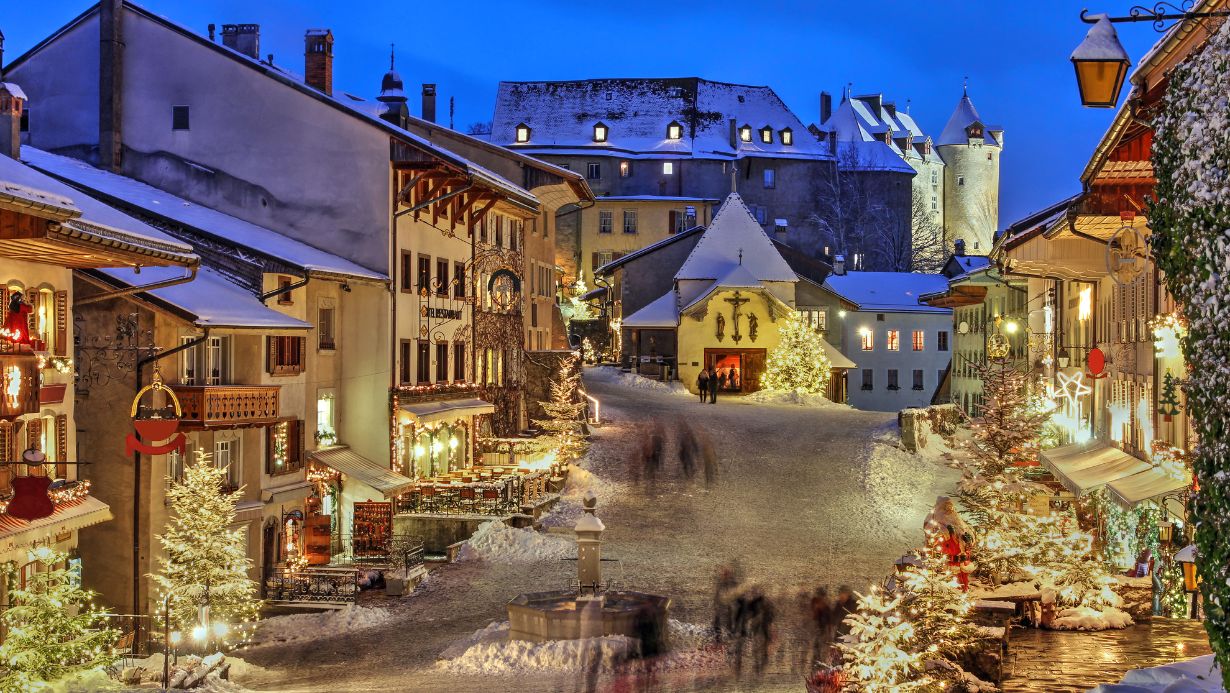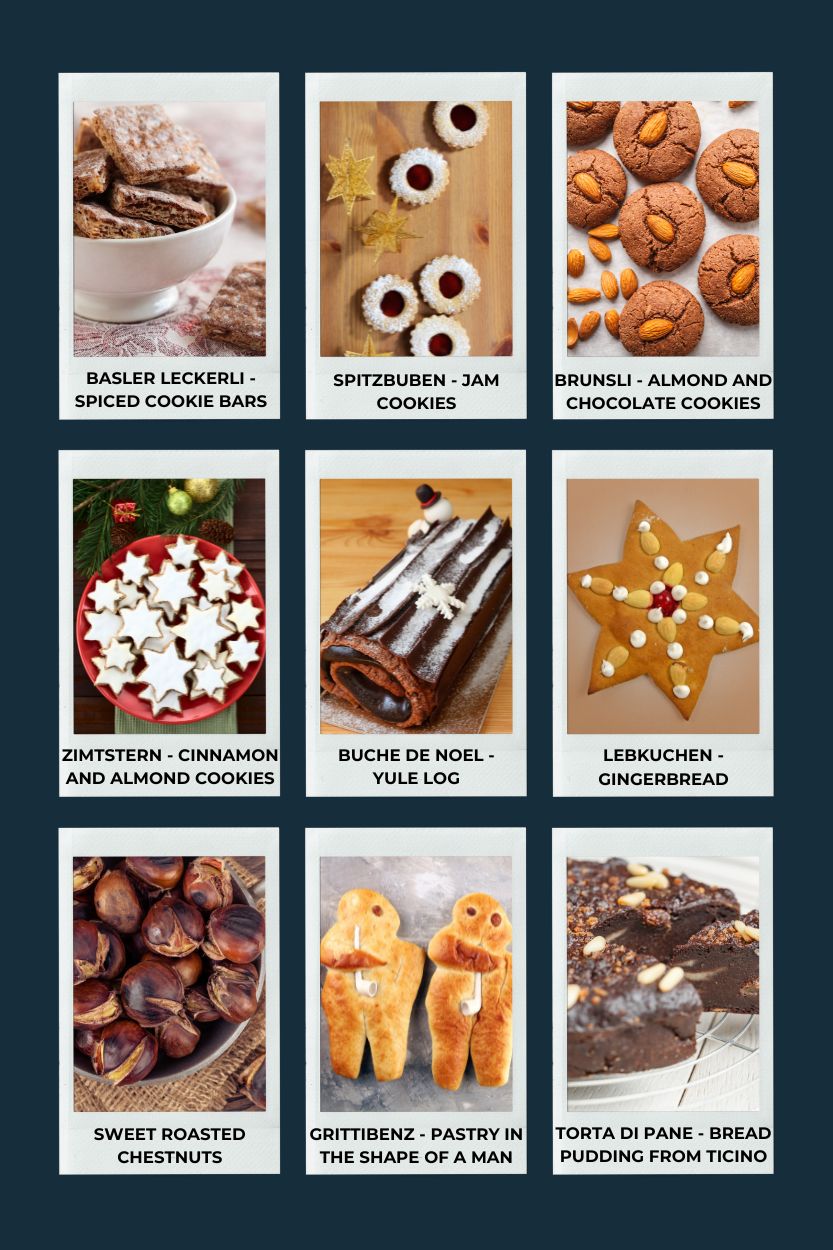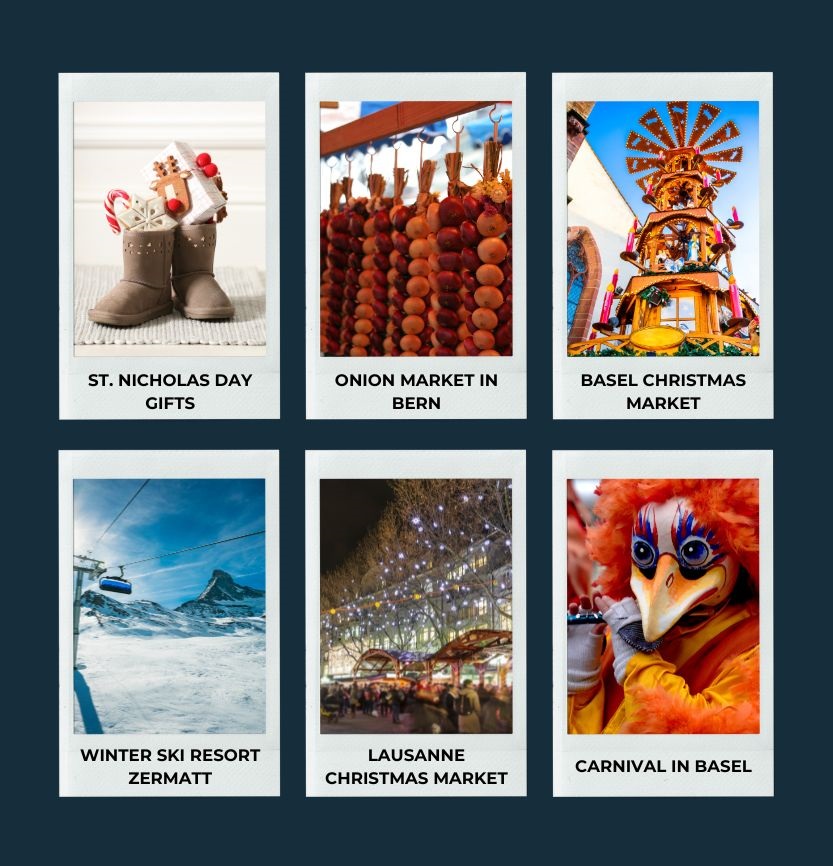Daily Life in Switzerland: Winter Edition
Winter is a magical time in Switzerland, with numerous celebrations and traditions, delicious dishes, and a wide range of winter sports. In today’s post, we’ll have a closer look at some general cultural facts and what daily life in Switzerland is like in the colder months.

Swiss Culture
No matter the time of year, Swiss culture is marked by punctuality, efficiency, and a strong work-life separation. Although good work performance is important for Swiss people, they also recognise the need for recreation and private life. That’s why you can expect a good work-life balance at Swiss companies.
Punctuality
Swiss punctuality extends to all areas of public and private life. For instance, almost 90% of Swiss trains depart within three minutes of the stated time, even though many areas see snowfall for three to five months a year. If there is more than a three-minute delay, an announcement is made.
Although it can take some time to adjust to the Swiss insistence on punctuality, it’s important to respect it. For many locals, punctuality is more than just a quirk. It is an expression of respect for other people’s time.
Work-Life Separation
In Switzerland, there is a clear separation between work and private life. The workday typically ends at 5 pm or 5.30 pm. Try not to contact your colleagues or clients after this time unless it’s an emergency, since this can be considered rude.
Vacation time is quite generous in Switzerland. The legal minimum is four weeks, but there are also several public holidays. The national average is nine days a year, but it depends on the canton. Ticino has 15 holidays, while Neuchatel, Graubünden, Solothurn, and Appenzell Ausserrhoden only have 8 each.
Strong and Tight-Knit Friendship Groups
Friendship groups tend to be tight-knit in Switzerland. Many people meet their friends early in life at school, after-school clubs, university, or in their neighbourhood. As adults, people might socialise at sports or leisure clubs. Some also form friendships at work.
At first, it can appear hard to “break into” these tight-knit groups. Often, becoming firm friends is only possible after several years of regular contact. However, persistence is worth it because many Swiss people are loyal long-term friends.
To get started, join local clubs, volunteer in your area, and talk to people at your workplace. Expat groups can also be helpful, especially if you don’t speak the local language yet.
Learn more: Podcast about International Associations in Switzerland
Winter Weather in Switzerland
Winter tends to be cold and snowy in many areas of Switzerland. If you live in the centre or north of the country, you can expect the first snow to fall in November or December. The temperature might drop as low as -14C (7F), and even lower in mountainous areas. In the southern cantons, you might have to wait for snow until December or January unless you live at a high altitude.
Getting Around in Winter
In most places, public transport runs all winter, so you can take trains, buses, and trams as usual. Delays can occur after heavy snowfall, so you might want to take an extra half-hour to get to your destination.
Winter tyres are common in Switzerland. In particularly snowy areas or places without well-maintained roads, snow chains are used. However, most roads in towns and cities are treated with salt or gravel, so they’re safe to drive on.
Exercising in Winter
Most Swiss people are used to exercising outdoors in winter. Popular sports are ice skating, skiing, snowboarding, and sledding. Low-impact activities might include walking, snowshoeing, or cross-country skiing.
Winter Foods
Switzerland is known for its cheese dishes, which are particularly popular in winter. The most common ones are fondue, melted cheese that is eaten by dipping bread into it, and raclette, melted cheese often eaten with potatoes and garnish such as pickled onions and gherkins.
Another popular option is rosti, a type of grated potato cake. This is easily customised with ingredients such as vegetables, cheese, meat, or fried egg. Rosti is a great side dish that goes well with sausages, fish, or meat stew.
Many Swiss families bake their own Christmas cookies, often based on old family recipes. There’s something for everyone. Aside from plain sugar cookies, you’ll get to enjoy ones with cinnamon, chocolate, nuts, and jam.
Some other sweet winter foods eaten in many areas of Switzerland are roasted chestnuts, Swiss rolls, fruit pies, and of course, plenty of Swiss chocolate.

Popular Winter Events and Activities
In winter, daily life in Switzerland is punctuated by many events. You’ll find something interesting to do virtually every weekend, especially if you’re willing to travel to different Swiss towns. Popular winter activities include browsing local Christmas markets, attending festivals and parades, and doing Christmas shopping on ‘Sonntagsverkauf’ days (Shopping Sundays).
Christmas Markets
Almost every Swiss town has at least one Christmas market. Many are open from late November to late December. You can usually buy traditional Christmas foods, ornaments, small decorative gifts, toys, and jewellery.
Some well-known annual Christmas markets are:
- Basel Christmas market: This is considered one of the most picturesque markets in Europe. It features around one hundred pine trees and a beautiful Christmas tree on Munsterplatz, a historical square in the city.
- Cathedral Square Market in Bern: The Munster, Bern’s cathedral, is 600 years old, although the tower wasn’t completed until 1893. Its portal features an elaborate representation of the Last Judgment and is the perfect backdrop for the local Christmas market.
- Lausanne Christmas Markets: In Lausanne, the Christmas markets are spread around town. They feature an opening parade, a Ferris wheel, and a children’s village.
- Montreux Noel: The Christmas market in the scenic town of Montreux consists of numerous craft stalls as well as a flying Santa, a Ferris wheel, and a candle workshop.
Festivals
In Switzerland, regional traditions are very important. That’s why you’ll experience a completely different set of festivals depending on where you live. In Geneva, people celebrate the Escalade festival, which commemorates the city’s victory over Catholic troops in 1602. The event features speeches, parades, and costume parties.
Residents of Bern celebrate the onion market on the fourth Monday in November. As the name suggests, this festival centres around onions, which are brought to the city from nearby farms. Aside from long braids of onions, you can also buy various kinds of foods and typical market items.
One festival that is celebrated almost everywhere in late winter or early spring is carnival. You’ll find the biggest carnivals in Lucerne and Basel, but smaller versions are celebrated in all big towns and many villages. Traditionally, the scary masks and costumes worn at the parades were meant to keep evil spirits at bay.
Shopping
Almost all shops are closed on Sundays. Residents spend this day with their families or pursuing their hobbies. However, this rule is relaxed in December. Two or three weeks before Christmas, many cities have ‘Shopping Sundays’, so residents can buy their gifts well in advance.

The Christmas Tradition in Switzerland
The festive period begins at the start of the Advent, the fourth Sunday before Christmas. Many families have Advent calendars marking each day and wreaths with four candles, one for each of the Advent Sundays.
St. Nicholas Day is on 6th December. The night before, children polish their boots and put them on the windowsill, in the hopes that Santa will bring treats during the night.
Many households have a Christmas tree, which is decorated with ornaments and often real candles. These are lit on Christmas Eve during the gift-giving ceremony. In some families, Santa visits children again on the 24th of December. He typically travels with a donkey and an evil companion called Schmutzli (’little dirty one’), who has a grey beard and wears a brown coat. In the past, Schmutzli was meant to punish bad children, but he is now simply Santa’s sidekick.
In winter, daily life in Switzerland is punctuated by festivals, markets, and public holidays. If you’re visiting or you’ve only just moved here, try to attend as many events as possible to get a taste of what’s available. Sign up for our newsletter to find out more about living in Switzerland, or apply to Rigby AG if you’re looking for a new job.